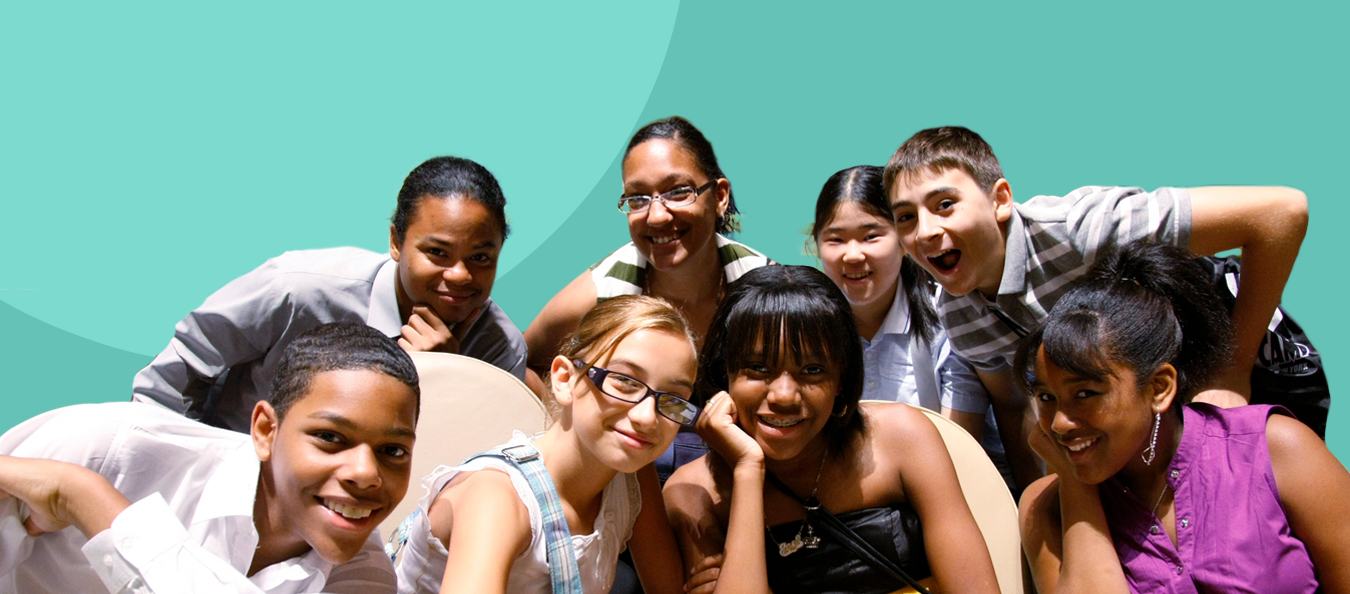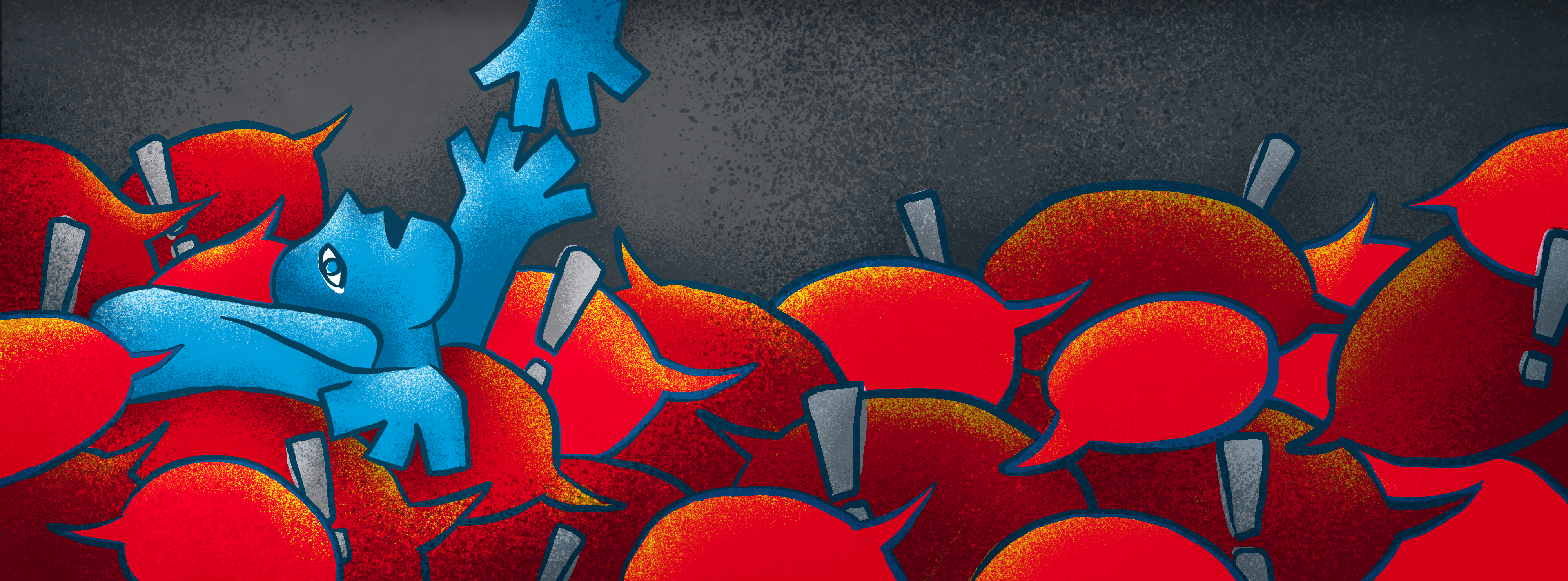S8-Episode 2: Invigorated by Africa
Stephen Jackson fell hard for Africa three decades ago, and never looked back. Now the UN Resident Coordinator in Kenya, he channels his passion into his work, bringing together UN agencies to support the continent in its drive for sustainable development.
“Sometimes in this job, you just end up falling in love with the country where you work. Kenya is a very special place, and I think is a country on an extraordinary upwards curve, a very rapid one. You meet incredibly inspiring people here, and I love it to bits.”
Africa is a continent set on rapid development, with many observers pointing to Kenya’s maturing democracy and green transition as a model for other nations. In this episode, Stephen Jackson reflects on Africa’s fascinating diversity, as well as its invigorating self-confidence, resilience and ambition.
Melissa Fleming 00:00
Sometimes in this job you just end up falling in love with country where you work.
Stephen Jackson 00:05
Kenya is a very, very special place and I think is a country that is on an extraordinary upwards curve, a very rapid one. You meet incredibly inspiring people here and I love it to bits. And it also has a very special place in my heart from a personal direction. I met my wife here. So, there are so many reasons why I love Kenya.
Melissa Fleming 00:37
My colleague Stephen Jackson is the UN Resident Coordinator in Kenya and his enthusiasm for the places he’s been posted in Africa is infectious. I’m so inspired by his hopes for a very dynamic future there.
From the United Nations, I’m Melissa Fleming. This is Awake at Night.
Stephen, you’ve worked in international humanitarian affairs for almost 30 years, but you seem to keep coming back to Sub-Saharan Africa. Why? Is there something about the places, the people?
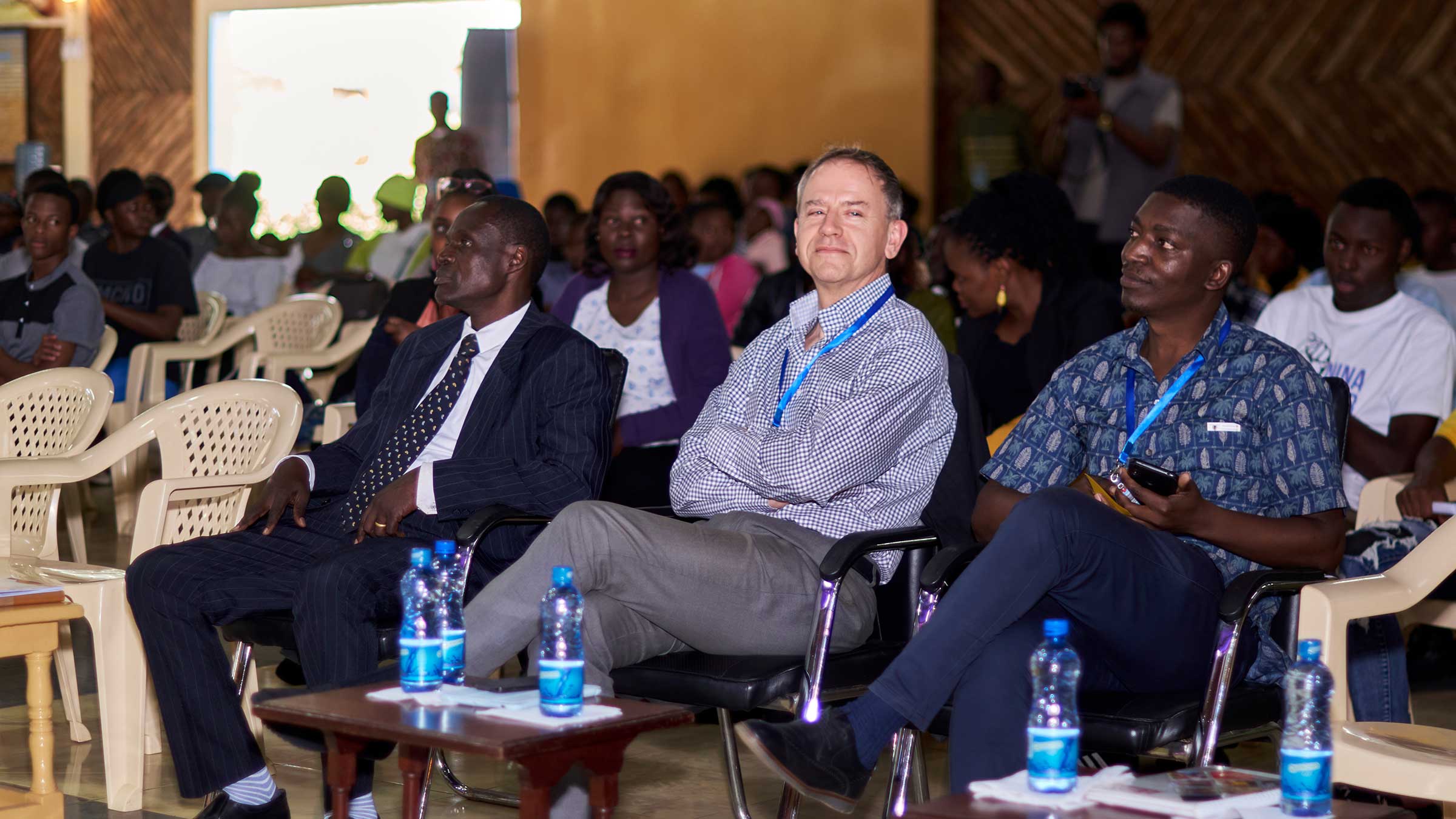
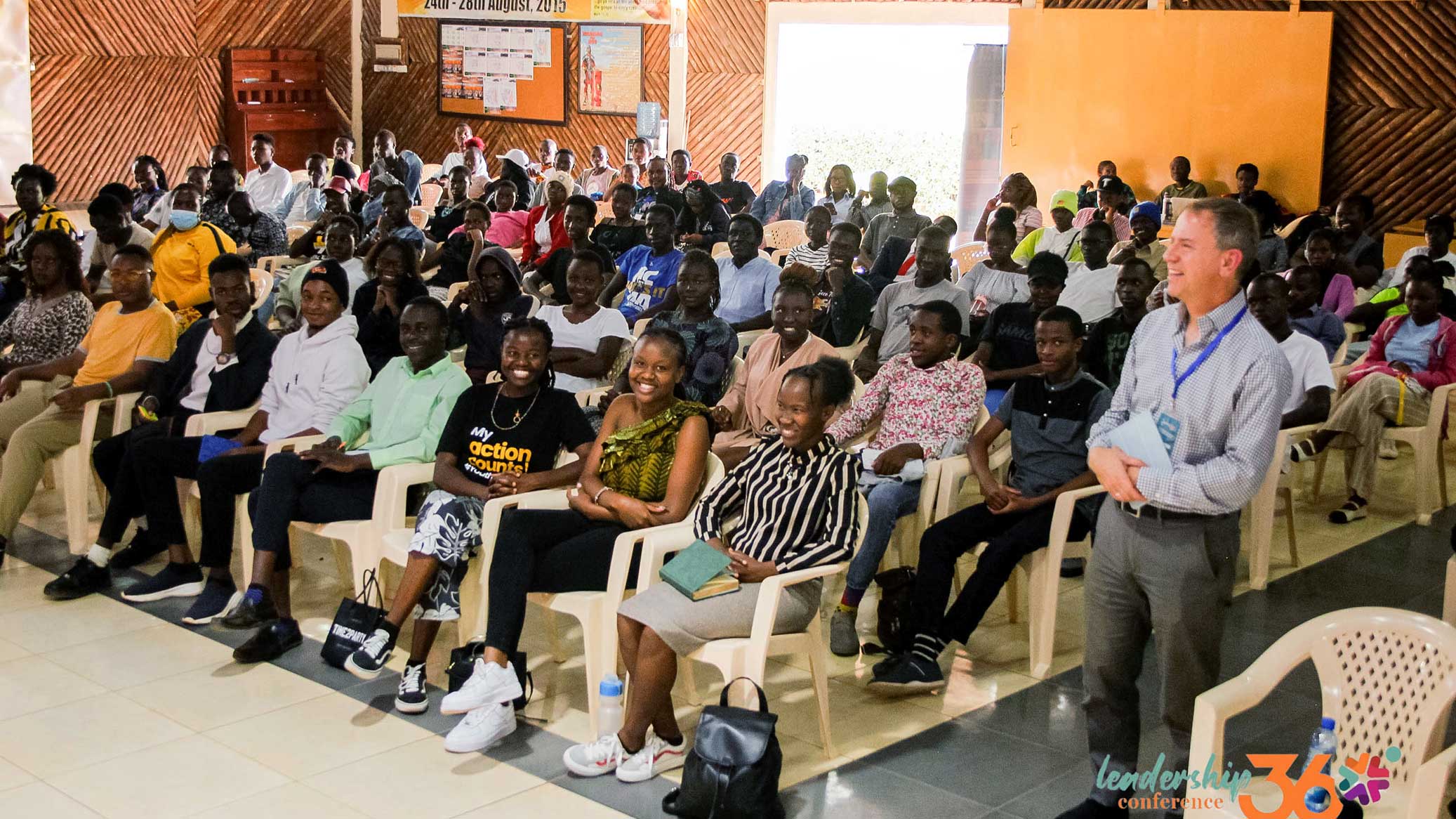
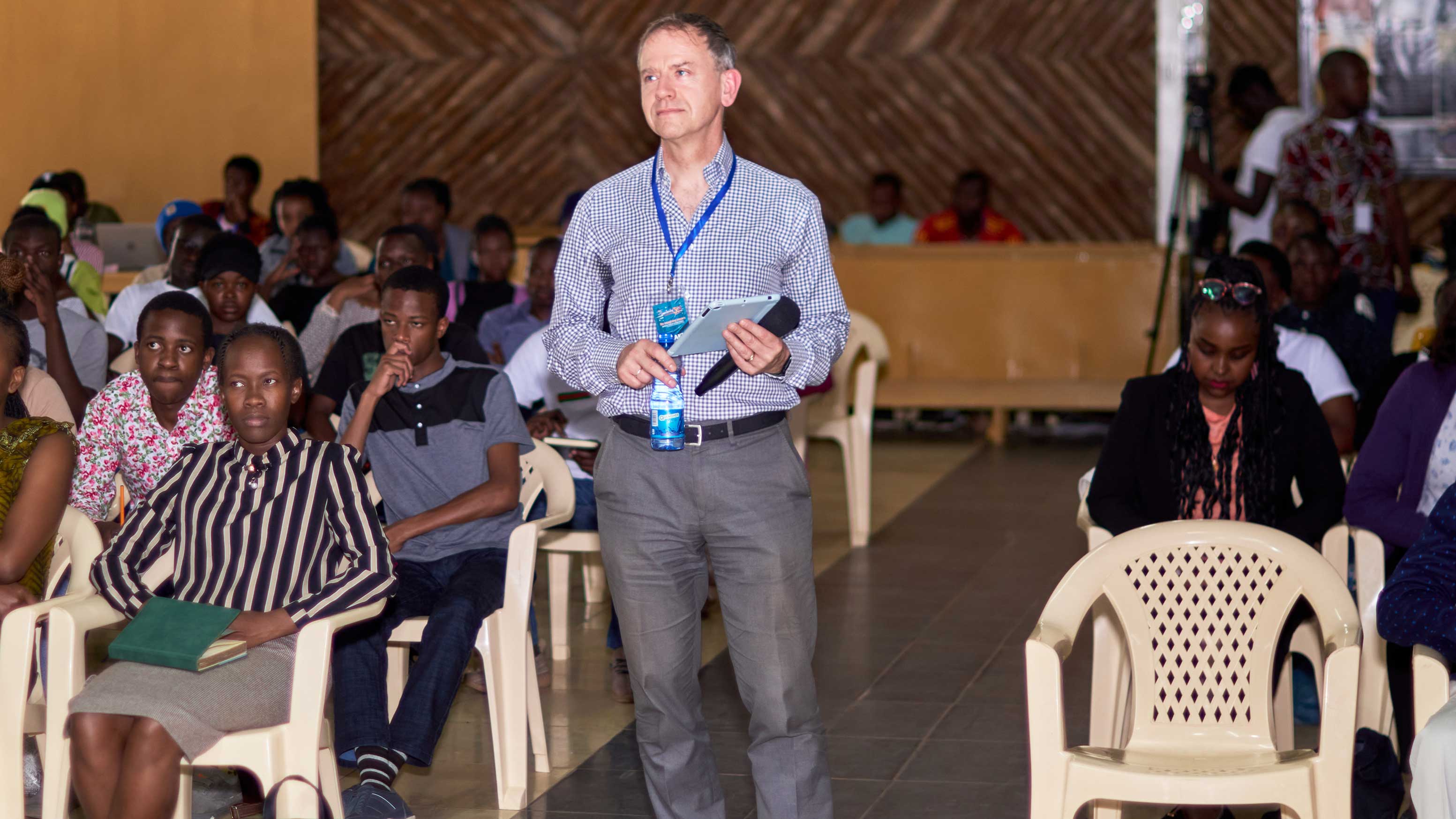
UN Resident Coordinator in Kenya, Stephen Jackson, at a youth event (Leadership Conference 36) in Kibera – Photo: © Kibera educational social and cultural organization – kibesco
Stephen Jackson 01:23
Oh, absolutely. I think you fall in love with Africa, and you fall in love hard. So, I’ve always loved it. In fact, full disclosure, I was even here as a tiny child, because my parents worked here in Africa in the 1960s. But I also think beyond the love affair there’s the fascination of it because this is a part of the world, that despite the clichés, despite the stereotypes that many I think would have in the Global North, this is a continent that is going places superfast. And it is a very exciting thing, and it’s a real privilege, actually to be a small part of that journey. And when I think we’d have to say in many other parts of the planet you see disillusion setting in, you see a sense of bewilderment at the future, you see a sense of loss of direction, if you can… might put it that way, in some of the societies that you and I both know, Melissa. This is a continent that knows where it wants to go. It may not entirely know yet how it’s going to get there. But I find that self-confidence, and that ambition, really invigorating to be a part of. And as I say, it’s a bit of a privilege.
Melissa Fleming 02:51
Well, this is an interesting start to our conversation, because I think many people who haven’t been to Africa, who just learn about Africa through news coverage, they either hear about wars, or you know, huge hunger events or drought. So, it’ll be really interesting to delve into why you think Africa is the place that is taking off the most in our world. Maybe just really quickly. I mean, what would you say to that person who only gets that kind of news?
Stephen Jackson 03:30
I’d say you’re only getting less than half the story. It’s certainly the case that Africa continues to have wars. And there are some in the neighbourhood here not too far away from Kenya, and they’re bad ones. But goodness, Europe is having its wars as well and has had them. And in the meantime, there are far more parts of Africa that are growing superfast. That are innovating. That are exerting positive constructive forms of soft power in the world. That are inserting themselves in meaningful ways at the global level in terms of really important debates of our time around the climate emergency, for example. That are striking innovations around the green transition, around the just energy transition. And I think none of that story, or very little of that story so far is making it to the news back home in Ireland, for example, where I come from.
Melissa Fleming 04:30
You’ve worked… I mean, now you’re in Kenya. You also worked in Gabon, and Burundi. Is there a particular place that you love especially where you’ve served?
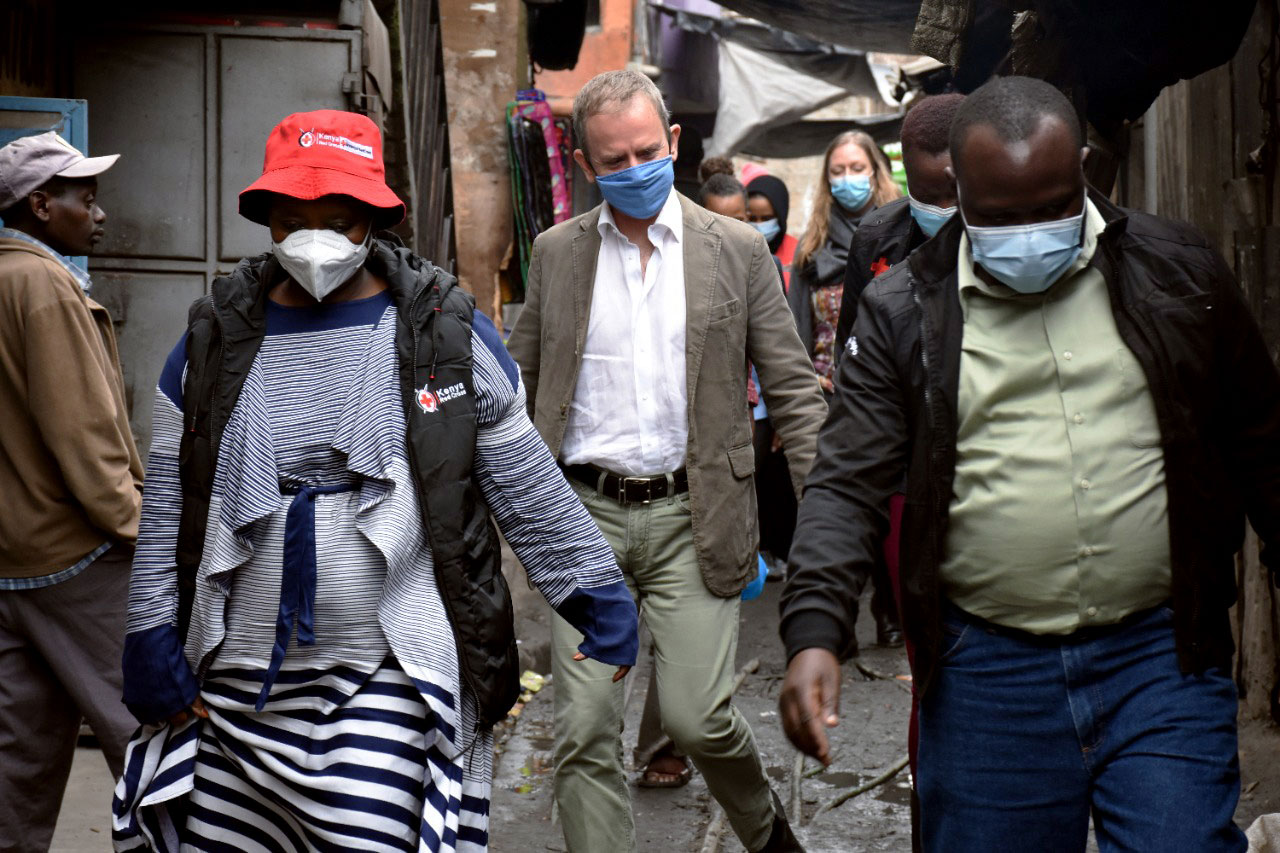
Stephen Jackson in the field at Mukuru slums, one of the largest in Nairobi – Photo: © Kenya Red Cross
Stephen Jackson 04:41
Oh, that’s such an awkward question to ask a Resident Coordinator, because it’s our job to say it’s the country where I serve – Kenya. Kenya is a very, very special place, and I think is a country that is on an extraordinary upwards curve, a very rapid one. And it’s one of the fastest growing economies on the continent. It is one of the hubs of innovation. You meet incredibly inspiring people here, and I love it to bits. And it also has a very special place in my heart from a personal direction. I met my wife here, even though neither she nor I are Kenyans. We were both working here in the 90s. So, there are so many reasons why I love Kenya. I do have to admit that there is also a massive place in my heart for two other countries that I’ve lived and worked in. I’ve loved every part of the continent I’ve worked in but particular fondness for both the DR Congo and for Burundi in different ways that are very, very special places. Much more challenged in some ways than Kenya, but also with extraordinary people. With extraordinary degrees of resilience and courage and exciting ideas about the future. So yeah, as I say, I fell in love hard with Africa 30 years ago, and I’ve never really lost it.
Melissa Fleming 06:06
Not many people would express such positive feelings for a troubled country like Democratic Republic of [the] Congo. I mean, what was it…? What was going on there when you were serving? And what…? If you could just describe, what it looked like and what it felt like to be there and some of the challenges it was going through?
Stephen Jackson 06:29
Well, absolutely. Let’s start with that that the Congolese people… And this I think, you know, one should never totalize in the way that I’m about to about an entire continent. A continent that, you know, on its way to a billion people that is full of 54 highly different countries, and great diversity. But nonetheless, let me generalize and say…
Melissa Fleming 06:55
And even DRC, which is massive.
Stephen Jackson 06:58
A continent in itself.
Melissa Fleming 07:00
I think as big as Europe.
Stephen Jackson 07:01
90 million people and, you know, 2,000 kilometres across. But it’s not just the resilience of people like the Congolese in the face of the huge challenges that they’ve had to live through. It’s actually…. And this risks being a cliché – it’s the joie de vivre. It’s the fact that the Congolese can still laugh, and enjoy life, and appreciate life in a way that sometimes I feel in the Global North, we’re in danger of losing. I know that that can sound like a terrible stereotype of people, you know, smiling through the tears or laughing through the pain.
But let me let me give you a story if I could, Melissa, from well before I joined the UN, back in the 90s, during the height of the war. And I was researching for my PhD in anthropology, which was about this dimension, I think, of Congolese resilience. And I had a great friend, who was working with one of the local NGOs. And he was a Muslim. About 10% or so of the population overall, I think, is Muslim. And he said to me one day, he said, ‘Stephen, you’re Christian, right?’ And I demurred a little bit and said, ‘Well, I… You know, raised in a Christian country. Let’s leave it at that.’ And he said, ‘Well, never mind. But your Bible, they have these horsemen of the apocalypse, right? How many of them have you got?’ Because he said, ‘I just want to check. I think you’ve sent us all four. You’re not hiding any, are you?’ And he was talking. This was Goma. He said, ‘We’ve had war. We’ve certainly had pestilence. We’ve had famine and plague.’ And he said, ‘And now…’ This was 2002. The volcano had just erupted and engulfed much of Central Goma. He said, ‘So now we’ve had fire. That’s the four, right? There aren’t any more, are there?’
And he was giggling as he said it. And I’ve just never forgotten it. The sort of the gallows humour of it, the sense of fun. Because what else can keep you alive than a sense of humour and that kind of resilience in the face of the kinds of setbacks and disasters that would probably have killed you or me.
Melissa Fleming 09:30
I’m just curious how you responded.
Stephen Jackson 09:32
I said, ‘No, don’t worry. Those are the four.’ Yeah, but… And I mean, I could go on. There are endless stories of oh, you know, the Congolese love affair with words. Incredible wordsmiths. Street poets, punsters. And if you’re Irish, you love puns, right? So, almost every day, somebody would say something howlingly funny in a context of absolute misery, you know. And well, maybe there’s something a bit in common, therefore, between the Irish and our love of gallows humour and that.
Melissa Fleming 10:17
Ireland has had its share of misery.
Stephen Jackson 10:20
Down the years. Doing better now but down the years for sure.
No to hate!
Hate speech incites violence and intolerance. The devastating effect of hatred is sadly nothing new. However, its scale and impact are now amplified by new communications technologies.
Melissa Fleming 10:24
Doing much better now. I’m wondering if… I mean, you mentioned also Burundi.
Stephen Jackson 10:32
Burundi, for people who don’t know it, is a small country in terms of territory, but very big in terms of populations. It’s one of the most densely populated countries in the world. It lies just to the south of Rwanda with which it shares many of the same characteristics. Traditionally a very strong polity prior to colonialism. And then that polity or that political structure more than a bit hijacked by the colonial power. More than a bit distorted by the colonial power. And those distortions rip along into the independence period. And so, Burundi like Rwanda, afflicted by waves of inter-ethnic violence, very, very destructively. When I first went to Burundi in 1992, I think a lot of people – coming again from North America, or from Western Europe – would come in and go, ‘Oh, my God, this is very unfamiliar territory.’ This degree of mistrust. This degree of violence. This degree, in some cases, of hatred between ethnic groups – quote, unquote, tribes. And find it very difficult to fathom.
Sadly, if you come from Ireland, it’s not that difficult to understand. It’s a very, very similar dynamic to the one that still afflicts the northern part of our country, Northern Ireland. In Northern Ireland, the organizing logic of hatred is religion. In a Burundi, or Rwanda, its ethnic identity. But actually, at the end of the day, the dynamics are very, very similar. So it wasn’t that I liked that when I first arrived in Burundi. And then a year later, indeed, in Rwanda in ‘93, and then in ‘94, but I’m afraid it was intimately familiar. And the way in which that logic of us and them works. Outsiders finding it very difficult to know how these differences become so inflamed when to an outsider everybody looks like they belong to one common pool of people. And so how different cues give the game away. Is it your name? Is it your accent? Is it the part of the country that you’re from? Is it the school that you went to? Those are all cues, by the way, in Northern Ireland, or indeed in Ireland as a whole. That’s how you work out whether somebody is Catholic or Protestant. And I’m afraid you grow up doing that in Ireland automatically. It’s not that you’re taught to do it. You’re taught to do it by the situation in a way that is subconscious and automatic and very pernicious. Well, works the same way in a Burundi or a Rwanda. So that’s what I mean by the similarity of the dynamic.
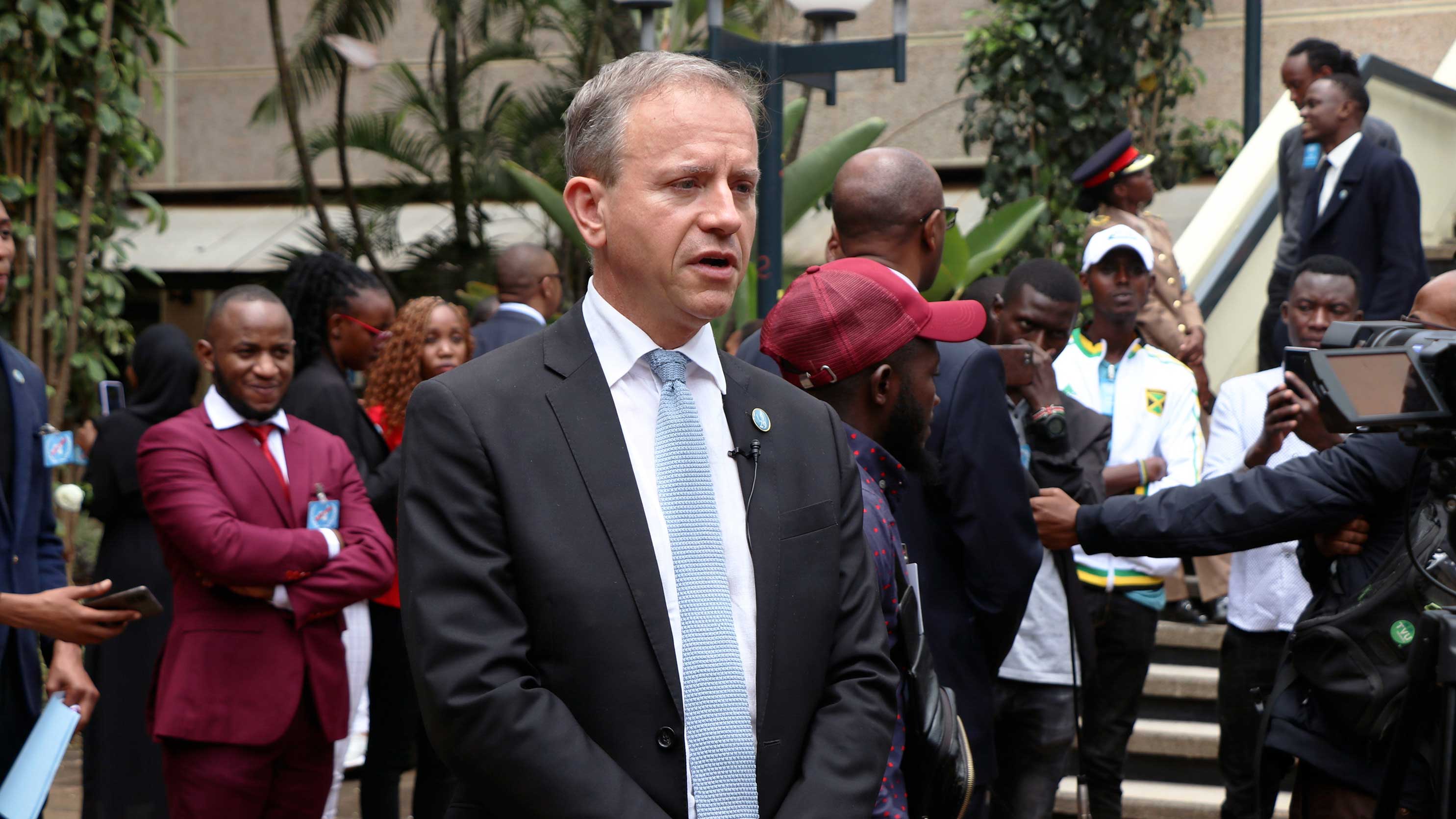
Stephen Jackson at the 29th commemoration of the 1994 Rwandan Genocide in Kenya. – Photo: © Augustine Karani
Melissa Fleming 13:32
Just to pick up on something that you said there. I mean, that dynamic led to a genocide in Rwanda. If those signals had been seen, do you think it could have been prevented? And what was the dynamic that tipped it over the edge? Was it media? Was it propaganda? Was it just not much talked about?
Stephen Jackson 14:02
I think the question of what, you know, what…. where the origin of that comes from is a very hard one. So, let’s put that aside. I think that’s controversial, and it’s… Where does anything ever begin? You know, Cain and Abel. The first murder that leads to the second that leads to the thousandth that leads to the millionth. But your question about what tips it over the edge. Well, I certainly think that economics plays a part. I think deprivation. And I think we know… We actually know from research and globally. Not just in Africa, not just in Europe, but globally. We know that the most dangerous thing is when inequality, internal inequality in a country is perceived, whether rightly or wrongly, to map onto identitarian differences of different kinds. That’s what the research shows.
Melissa Fleming 15:05
Do you think now that we’re in the social media era, do you think that we’re in a more dangerous place for when we have those kinds of situations of inequality and othering that you just described?
Stephen Jackson 15:19
That’s a really interesting question. I’m tempted oddly enough to say no. I don’t think it’s necessarily more dangerous. And the reason why I think it’s that classic point, isn’t it, that any new technology can work for both good and for ill? So just as social media, the Internet, the rapidity of all of that allows, you know, a kind of a vortex of disinformation, a vortex of hate to propagate very rapidly. But it does also, if we seize the opportunity, it does give us a set of tools with which we can also combat that kind of vortex very quickly as well. And with a kind of reach that we couldn’t have had before. I think there is enormous potential there. So, I don’t know. Then it’s an arms race, isn’t it? You know, which one’s going to win?
Melissa Fleming 16:20
It is an arms race, yes. And that leads me to come back to Kenya because I remember having a conversation with you before the election, the August 2022 election. I believe you said it was a model for other African countries. Why?
Stephen Jackson 16:38
Because we had a knife edge close election. In a country that has had its brushes with difficult elections in the past, and quite large-scale electoral violence in the past. And yet, you had one of the cleanest, one of the most orderly, one of the most transparent elections ever in Kenya. You know, some issues at the margins. But where aren’t there? Anywhere in the world no election is ever perfect. You had a knife edge result, a difference of about 200,000 votes, there or thereabouts. And yet, the country remained peaceful. And the challenge that was brought by the opposition was definitively settled by and at the Supreme Court. So, every institution did its job. That’s really the point that I’m trying to make now. I’m making it sound, you know, smooth. Like I said, no election is ever smooth, and there were moments. But for me, and I think for many international partners like us that were up close and personal to that, it was an extraordinary thing. And it really did provide a very inspirational model. And by the way, you know, we’ve seen very powerful countries have knife edge elections and have very, very significant difficulties, including violence.
So, I think Kenya deserves a lot of credit for it. The 2010 constitution really lays out that institutional map in a way that I think is very visionary. To take proactive steps to maintain peace. To sustain peace. To maintain national cohesion. To have failsafe mechanisms. To have grievance resolution mechanisms. To have ways of ensuring that difference and dissent don’t turn into violence. And I think that’s the genius of Kenya’s constitution. I don’t know too many countries around the world that have this, what we call a national peace infrastructure. If I can make a strange analogy, it’s a public health model, you know. An ounce of prevention is better than a pound of cure. So that’s why we put fluoride in the water. It’s why we get vaccination. It’s why, it’s why, it’s why. We take all of these precautions to keep a healthy population. Well, it’s like that. It’s taking all of these precautions to maintain a society that is cohesive, that can handle difference and dispute in nonviolent ways. Does it always work? No. We’ve had actually street protests in the last 48 hours here in Kenya that very sadly turned violent, and there was loss of life. And that is very much to be regretted. But like I said, that also happens in other parts of the world. That has happened in my part of the world.
Melissa Fleming 20:00
It’s an interesting concept of a public health model for peace and cohesion and prevention. I just want to come to your actual job because what is your role in all of this as Resident Coordinator in Kenya?
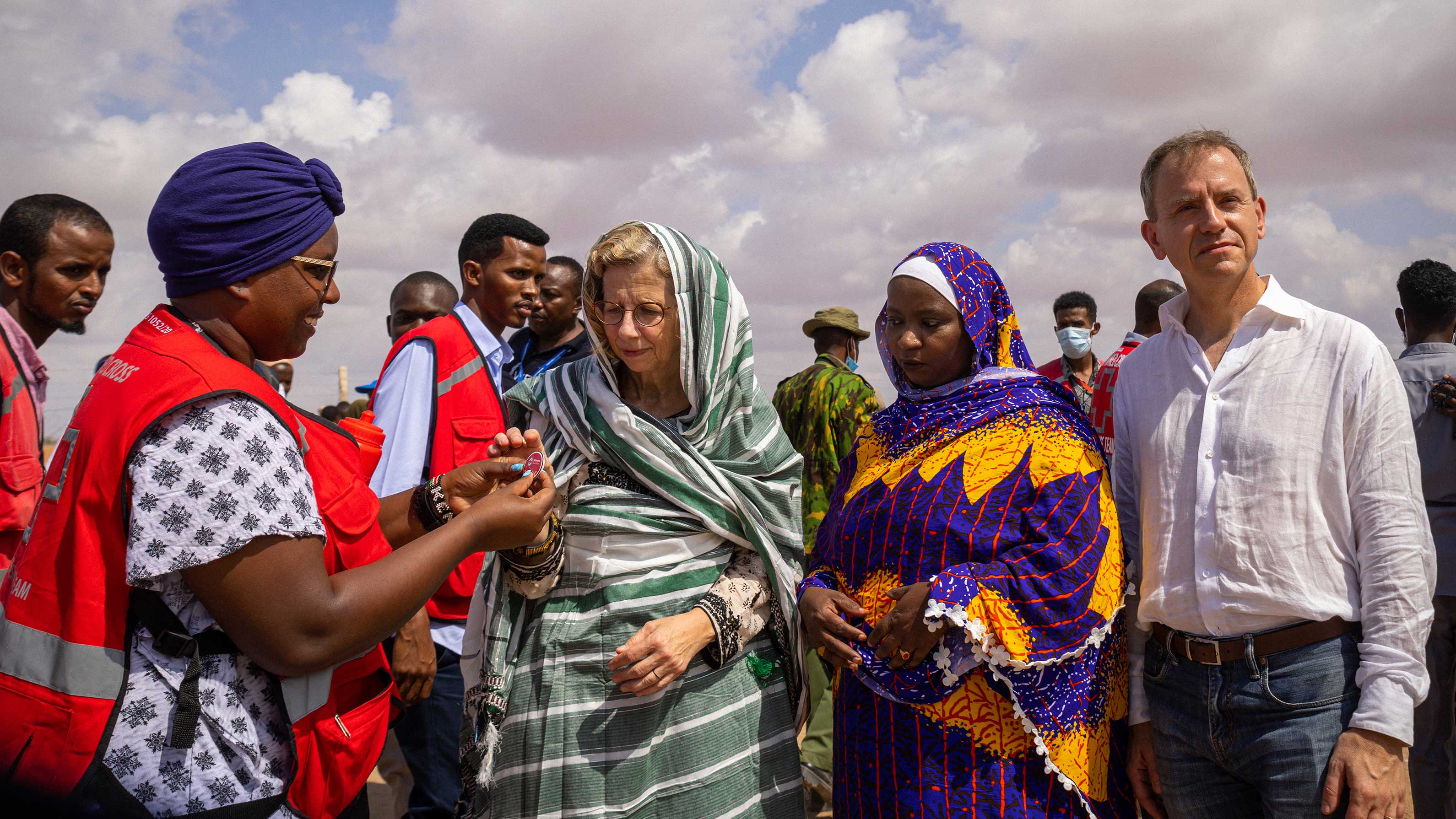
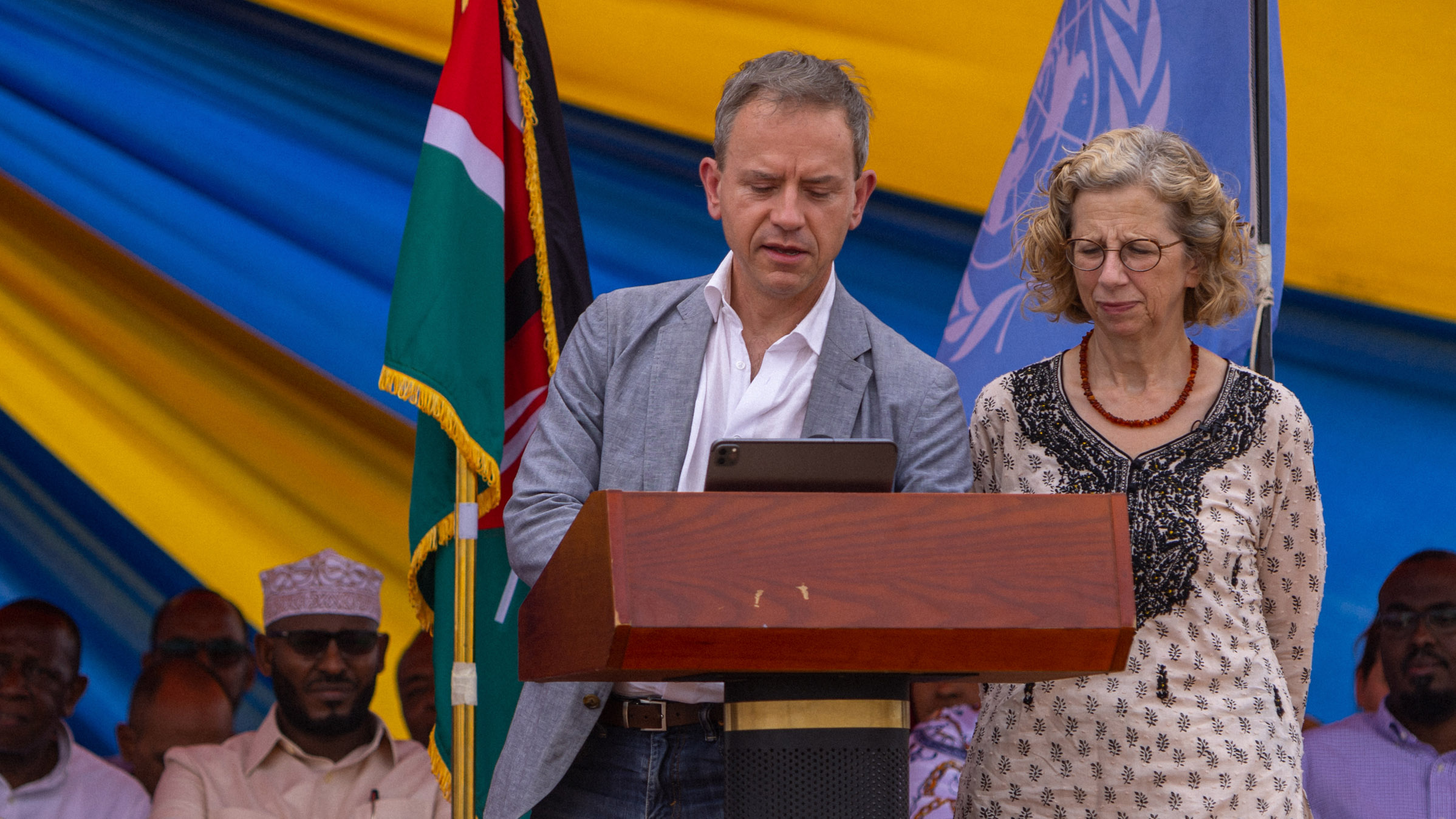
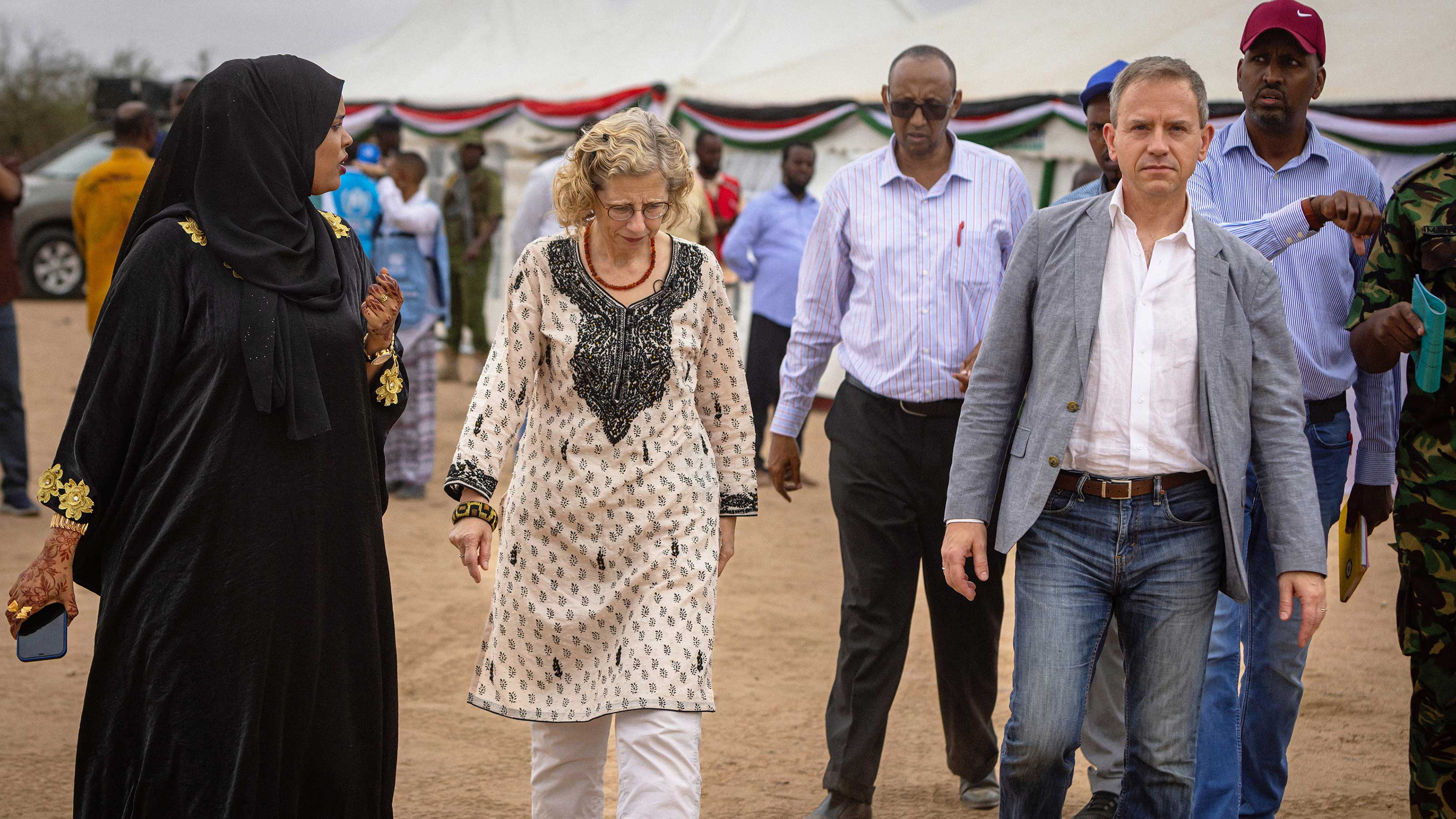
UN Resident Coordinator in Kenya, Stephen Jackson, and UNEP Executive Director, Inger Andersen, during the launch of the 2022 Drought Flash Appeal in Garissa County, Kenya. In the very first photo: left to right are Red Cross Chair Dr. Aisha Mohammed, UNEP Executive Director Inger Andersen, and Stephen Jackson – Photo: ©UNEP
Stephen Jackson 20:19
Well, those listening to us on the podcast won’t be able to see the beautiful SDGs behind you, the Sustainable Development Goals. But there they are, all 17 of them displayed with their icons. Elimination of poverty, elimination of hunger, effective education, and health. And going all the way through to climate change, biodiversity. Those 17 Sustainable Development Goals are my job. That’s my job to bring the energies and the expertise of the whole United Nations system. That alphabet soup that runs from FAO, the Food and Agriculture Organization, all the way to WHO, the World Health Organization. And through all of the different UNs – UN Development Programme, UNICEF, and many, many others. We have 25 or so of those UN agencies, funds and programmes in our UN Kenya Country Team.
It’s my job to bring them together to make sure that the support that we offer to Kenya’s government and Kenya’s people is greater than the sum of its parts. And then it actually goes a bit beyond that, because the first step is us coming together. But then actually, even together, we’re not big enough really to move the needle or to help Kenya move the development needle. You have to use your expertise, but also your weight to influence the flows of much bigger forms of development. The kinds of development financing that is delivered by the World Bank, the IMF, the big vertical funds, but particularly the private sector. So, what we’re trying to do is to really crowd in that kind of engagement for the SDGs, for the Sustainable Development Goals. And it’s, I suppose, my job to coordinate that.
Melissa Fleming 22:25
I wonder, what is keeping you awake at night when you think about Kenya in your role there and this daunting task?
Stephen Jackson 22:33
Well, it’s almost like we’ve set this up, isn’t it, Melissa? What keeps me awake at night is the thought of failing that. And I don’t mean individual failure. Although of course, I do also mean that. I don’t want to fail. I want to feel that I’ve contributed, that I’ve helped. But much bigger than what I want is… It’s going back to the start of our conversation. Kenya is this quite extraordinary place. I knew it first in 1986 as a student when I came here on a visit. And then I knew it again in 1992 when I first started my career as a young intern in the office of a big international NGO here in Nairobi. And if I measure where Kenya has come from, and where it’s got to, more or less precisely three decades later, 30, 31 years later. That journey has been extraordinary.
The country is bigger, more powerful in the positive sense of that word. More influential on the continent and in the world. Its voices being heard at the global level. I think Kenya will continue on that trajectory. There’ll be bumps and ups and downs as there are anywhere in the world. But I have no doubt that Kenya is on an upward curve. I want the UN to contribute to that. I’m sure we all in the UN want that. And it keeps me awake at night that we might fail at that. I don’t think that that means, by the way, that Kenya will fail. Because I’m not sure that we’re the key ingredient. But I would hate it if we didn’t maximize every opportunity that we have to help advance that story. Kenya deserves it. And I think middle powers like Kenya really are needed to help shape the global trajectory. Let me… I’m being too philosophical. Let me make that as concrete as I can. The climate emergency. Where are the solutions going to come from? If you look at the African continent, you’ll see a continent with the greatest natural endowment of renewable energy resources anywhere in the world. Whether you’re thinking solar, hydro, wind, geothermal, wave. You name it.
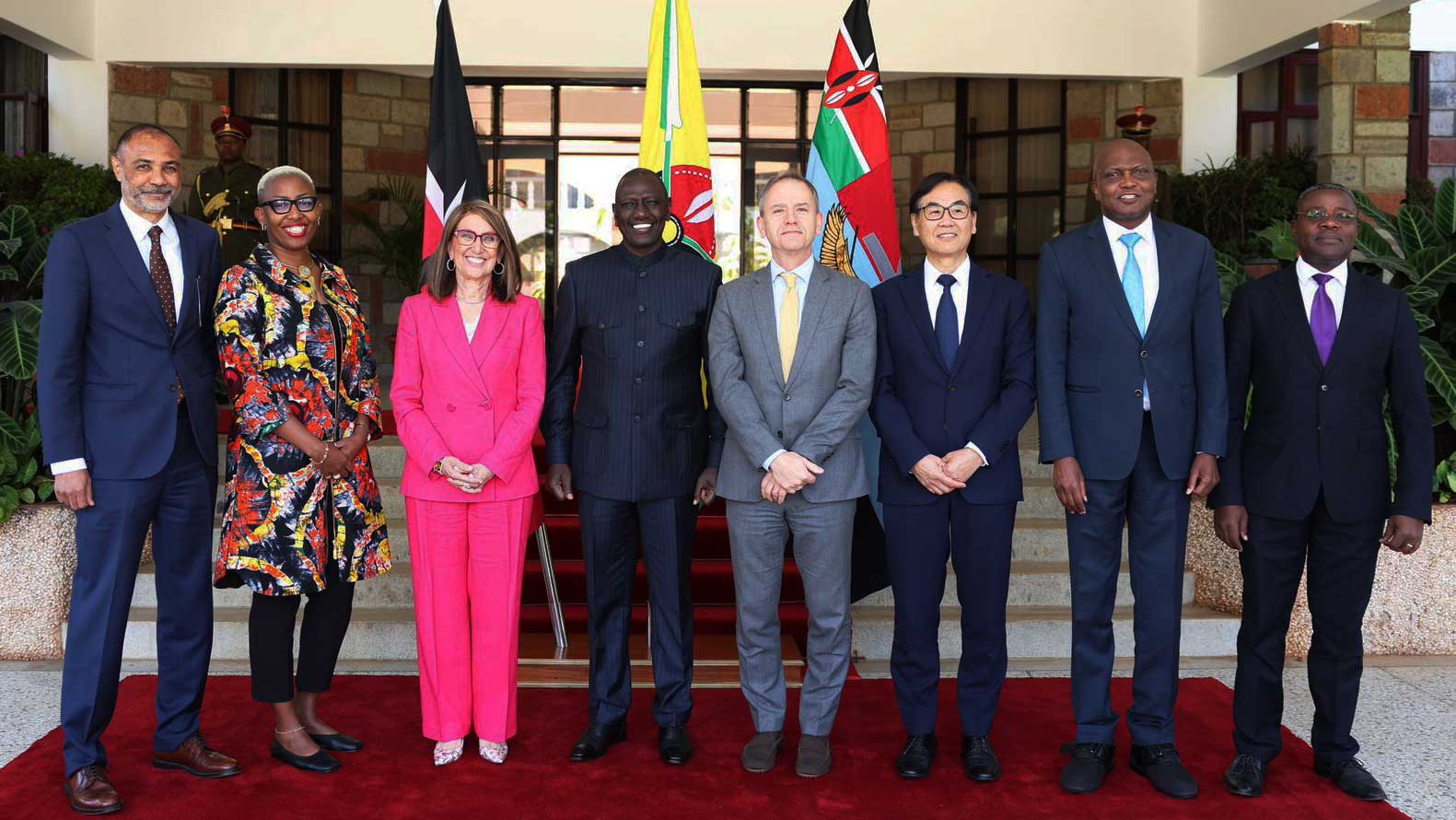
A group photo with President William Ruto after a bilateral meeting with UNCTAD Sec Gen Rebecca Grynspan and UN RC in Eldoret Kenya – Photo: ©State House Kenya
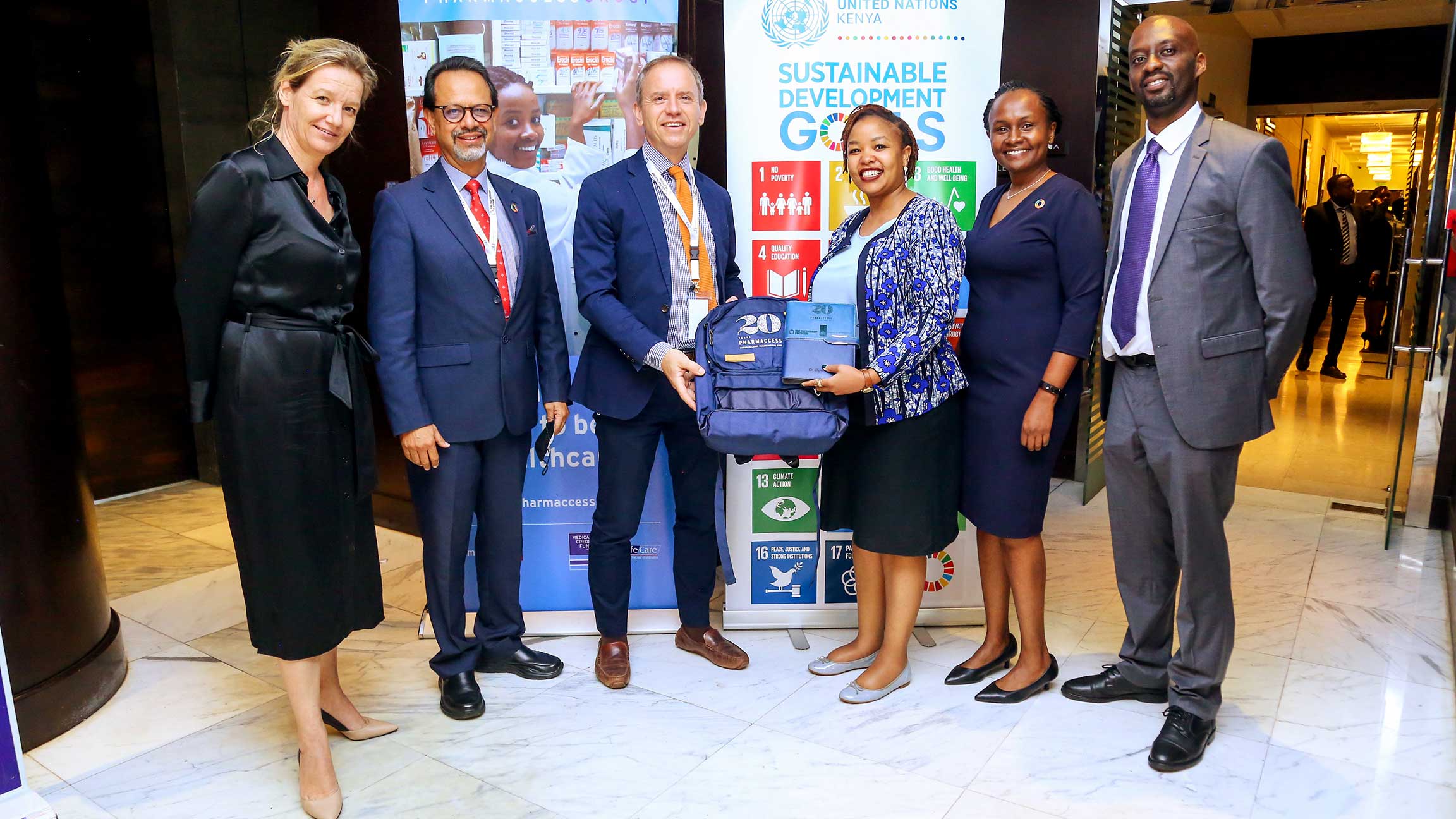
The UN Resident coordinator with health private sector partners at a health conference in Nairobi – Photo: ©Irene Karanja
Melissa Fleming 25:07
Let’s come back to something that you mentioned at the beginning was that you also have a love story that originated in Kenya. So, you met your wife there. What was the circumstance? How did you meet? How old were you? What were you doing?
Stephen Jackson 25:25
Oh, I was young then. We met when I was 27 and Laura was 25. I’m Irish. Laura’s American from Idaho, so, two I’s. Two places that grow potatoes. But that wasn’t what brought us together. We were both interns working for an international NGO here. And we met actually in 1994. Earlier in this conversation, we, Melissa, you and I, we were talking a lot about the genocide in Rwanda. And I was working. I was in Rwanda but coming backwards and forwards to both Bujumbura in Burundi where we were having a sort of our supply base for the emergency operations we were running. And then to Nairobi, which was then and is still very much the regional humanitarian hub for this part of the world. And Laura had actually taken over my job. I’d been there the year before her. We’d never met. But a whole bunch of people were conspiring to put us together already having met each of us independently. Yeah. My brother actually met her, because he was working here too. Met Laura and sent me a message saying, ‘I’ve met the woman that you’re going to marry.’ Yeah, isn’t that spectacular?
Melissa Fleming 26:48
Really?
Stephen Jackson 26:49
Yeah.
Melissa Fleming 26:51
That is incredible. Your brother must know you really well.
Stephen Jackson 26:54
Well, yeah. He had it worked out from very early on, as did colleagues in the NGO that had known us both. So much so… There was so much…
Melissa Fleming 27:06
So, what was your first meeting like? Can you describe the encounter.
Stephen Jackson 27:11
Oh, I can. Because it’s… How long have you got? It’s a lovely story. So, everybody had been conspiring to put us together. And finally, I flew in for one of these planning missions in the context of the Rwandan emergency response. And it was May the 12th 1994. And the reason I know that is that it was the day before her birthday. And both of us had been built up for this. And I think both of us were a bit prepared to be disappointed. And I remember going into the office and meeting her and going, ‘Wow, I am very definitely not disappointed.’ And we had so many things in common already. A deep love for classical music. Laura is a terrific pianist, and I suppose I’m not a bad classical singer. We’re both vegetarians lifelong. We both have this deep love for Africa. Laura was here in Kenya as a student. So, so many things sort of pushing us together. And then, so we went out for lunch, and then we went out for dinner.
And then the following day I was due to fly to Bujumbura in Burundi and then go back into Rwanda from there right into the middle of the of the genocide and the war. And the driver – Ferdinand was his name. If Ferdinand is this listening out there, make contact. I haven’t seen him in 30 years. Ferdinand knew all about this and was part of the conspiracy to get us together. And so, is saying, ‘So, how did it go?’ And I said, ‘Actually, pretty good really. I’m pretty interested. I don’t know about her.’ And he said, ‘Oh, great. So how did you leave things?’ And I said, ‘Well, you know, obviously, I’m heading off to this. And I don’t know when I’ll be back. But I said, I’ll be back. And I feel a little bit badly. Because here I am on the way and it’s early morning. I’m on my way to the airport. And this is actually her birthday.’ Melissa, I’m not making this up. Ferdinand put his foot on the brakes hard and pulled over to the side of the highway and said, ‘You’re not leaving. You can’t leave on her birthday.’ And I said, ‘Don’t be ridiculous. I’ve got a flight to catch. There’s an emergency in Rwanda.’ ‘No, no, no, no, no. You’re not leaving.’ I said, ‘Come on. We’ve got to go.’ And he said, ‘Well, you’ve got to send her a present.’ And I said, ‘Well, look. If I give you some money, can you take some flowers?’
Anybody who knows Nairobi knows that Nairobi is famous for its beautiful flowers. So, by the side of the road, right? So, Ferdinand says, ‘Yeah, look give me what you’ve got, and I’ll go and get some flowers and I’ll deliver them.’ And so, I took out I think 1000 shillings, which these days is about $10. I think back then it would have been about $20. And I gave that to him. And I thought to myself, ‘You know, this is nice. This will actually buy quite a large quantity of flowers. And there’ll be some leftover for Ferdinand, just to say thank you to him.’
He arrived later that morning into the offices of the NGO to the reception desk, according to the receptionist, who I knew quite well as well, basically like a walking arboretum. I mean, you couldn’t see him behind sort of about this many flowers. For the listeners at home, I am holding my arms wide. I mean, he literally was carrying about, you know, 10 kilos of cut flowers or something. He clearly not only spent all of my money that I’d given him, but added quite a bit of his own because he thought I was being a cheapskate. And from behind this sort of forest of flowers, says to Betty the receptionist, ‘These are for Laura from her boyfriend Jackson.’ So, there was no going back from that, was there? And so…
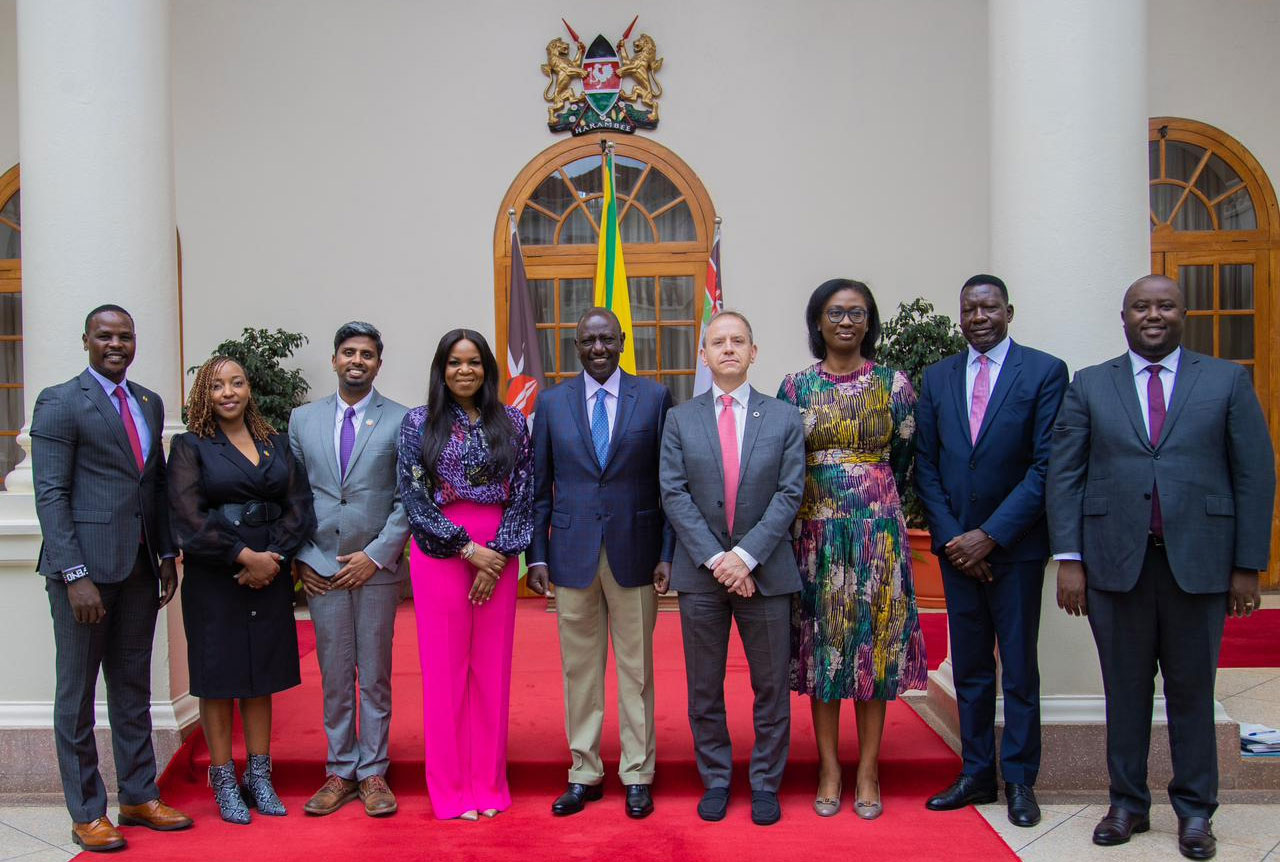
Stephen Jackson, Special Representative of the UN Secretary-General (UN SRSG), Damilola Ogunbiyi and President William Ruto during a bilateral in August 2023 at State House Kenya – Photo: ©State House Kenya
Melissa Fleming 31:13
I really hope you get to see him again.
Stephen Jackson 31:15
Yeah. The nice thing about it, just to sort of bring the story full circle, is that 25 years later… So, we met in ‘94. We got married in ‘96. And in 2021, celebrated our 25th wedding anniversary in the same restaurant here in Nairobi where we had our first date.
Melissa Fleming 31:41
An Indian restaurant, I believe.
Stephen Jackson 31:42
That’s right. Haandi. Great restaurant. We put a free shout out to the Haandi restaurant here in Westlands.
Melissa Fleming 31:49
Haandi. And you have three children, I believe.
Stephen Jackson 31:54
Three children. Liam, who is 22. Finn, who is 20. Both of them off and out in the world, university and graduating. And then Kira, our daughter, who is 16 and with us here at school in Nairobi and loving it.
Melissa Fleming 32:10
It’s a wonderful story.
Stephen Jackson 32:11
And they were with us through all of this. Through Gabon, and DRC, and Burundi. Lived and grew up and educated there. So, they spent most of their lives on the continent too.
Melissa Fleming 32:20
I’m just wondering what sparked your interest in kind of serving the United Nations or international affairs? And how did you end up in Kenya? Was this an influence from your family?
Stephen Jackson 32:32
It was, but funnily enough it was an influence against which I struggled for quite a while. So, my parents, my mom and dad met working for Oxfam in the 1960s. And they lived and worked in Togo in West Africa at the end of the 1960s when I was tiny. I was one and a half. So, we were there for two years. Left when I was three and a half, which meant that I don’t really have any concrete memories of it. But it was knowing that I had been there was always part of the backdrop. And my father… My mother went back to a teaching career, but my father went, moved us back to Ireland, where he was headhunted to run the Irish government’s volunteer sending agency, an agency called APSO. And he did that for 15 years of his career. My great love… I was always aware of that. I was always very supportive of that. We always had people from far flung corners of the world coming and staying with us in the house in Dublin, from the African continent, but from Asia and Latin America too. And was very immersed with that and very politically active, but actually my great love as a teenager was maths, and computers, and physics. And that was my undergraduate degree. And I was absolutely firmly convinced that I was going off into research, a research career in artificial intelligence, or in theoretical physics. One or the other.
And then had this conversion experience. I think I mentioned earlier that I was here in Kenya, as well as in Tanzania, which I didn’t mention, in 1986. That was the summer of my second year going into my third year of my undergraduate maths degree. And the Irish government organized a debating competition on development themes, the Department of Foreign Affairs, university wide in Ireland. I got pulled into the team as a kind of a ringer. I was a debater at college, which probably doesn’t come as a surprise. And we won the competition. And the prize was a study trip to East Africa. And I came here and went, ‘Oh, this is why my dad and mom did this. This is fascinating. This is what I want to do.’ And it was actually more than… Tanzania was great, but it was Kenya. Even then that was the conversion experience. Because I was so struck by this combination of tradition and modernity already in 1986 in this country that was on an upward curve and that was it. Fell in love. That’s what I wanted to do.
Melissa Fleming 35:24
You were working in the aftermath of one of the world’s worst genocides in Rwanda. How has that kind of shaped you, seeing and witnessing the effects of war and atrocities and genocides?
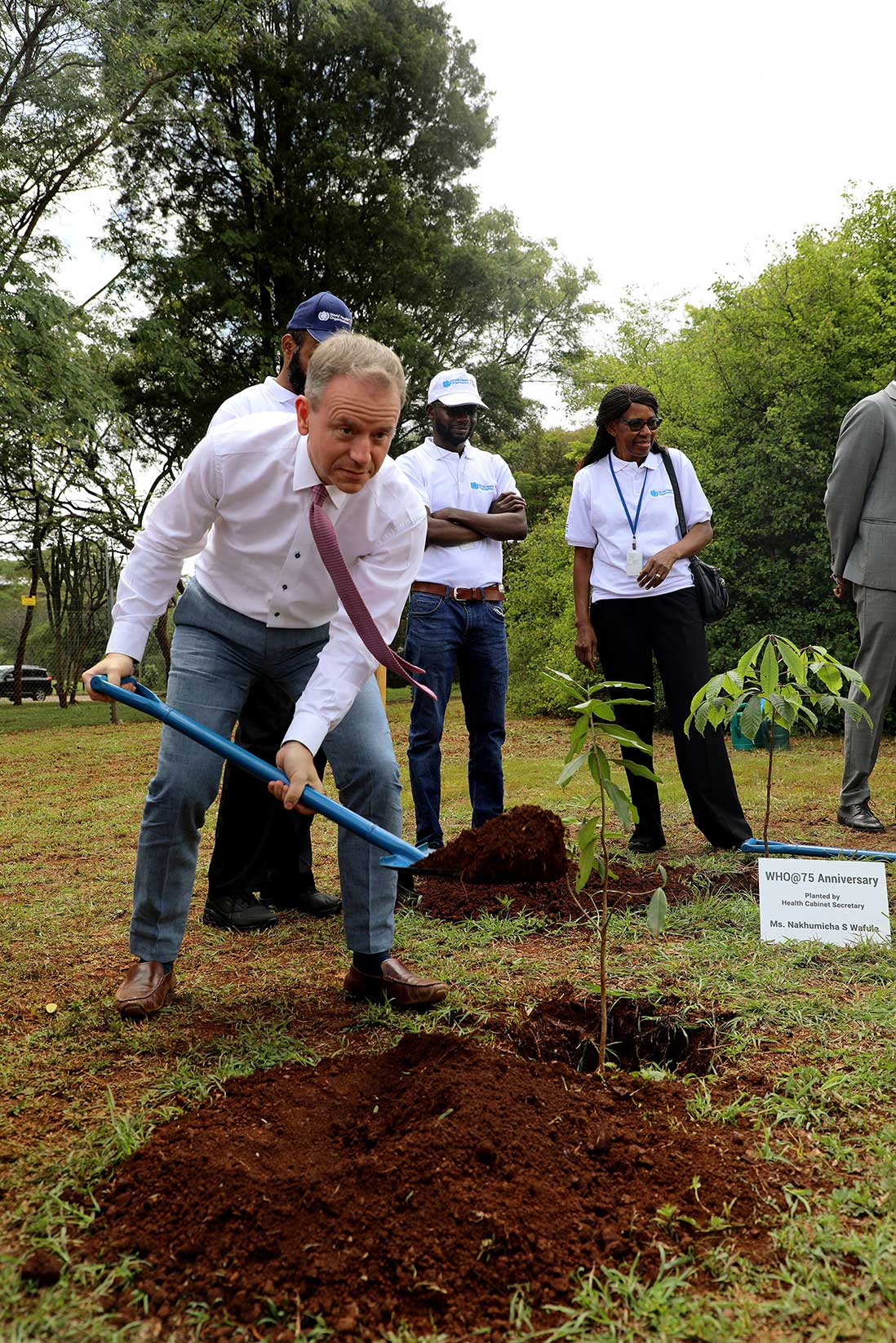
Stephen Jackson plants a tree on the seventy fifth anniversary of WHO – Photo: ©Stephen Jackson
Stephen Jackson 35:44
Yes, it really has shaped my professional life, and it’s also shaped my outlook on life. I don’t take it for granted that any country in the world is beyond conflict. I don’t take it that any country in the world is immune from the kinds of meltdown that happen to be afflicting right now, you know, 25 countries or so in the world, but could just as easily happen again in parts of the world that are at the moment at peace. And so then, I think that does shape my philosophy about first of all, what life is and the beauty but the fragility of life. You can’t, as a young person, as I then was, see that kind of suffering and destruction without it leaving a very deep mark. It’s very easy for me, and I won’t do it now, but it’s very easy for me to, you know, start recollecting things that I saw, friends that I lost. Reconstructing in my mind the vivid nature of that kind of suffering. And it reduces me to tears in a second 30 years later.
But it also then, I hope, informs the sort of the professional side of me. First of all, I hope it keeps me a bit modest. I may not sound very modest on this podcast. But that I don’t hold myself above a Rwanda, or a Kenya, or a Somalia. I don’t regard… I love Ireland very deeply. I don’t know if I’m supposed to say that as a United Nations official. But anyway, I will. I love my home country very deeply. I’m very proud of it. But I don’t necessarily think it’s any better, or any stronger, or any more immune. I think we’ve had our share of good luck and ill luck in Ireland. And we are where we are. But it’s really important to me, and I suppose that, yeah… Finally, via a circuitous route, finding my way to your real question, Melissa. That’s why I work for the United Nations. Because every country, and every person is actually fundamentally the same. We’re all of course different in our different ways. But we are all the same. And we all face the same challenges. You know, when death finally comes as it does to all of us, that’s when you learn, you know – perhaps too late for some of us – the hard lesson that we’re all the same. We start the same way. We end the same way. And that for me, that’s a very deep conviction that I try to live up to. I’m not sure I do on a daily basis, but I try to retain that.
Melissa Fleming 38:59
Thank you, Stephen, for joining me on this podcast.
Stephen Jackson 39:04
It’s really been a privilege. Thank you so much Melissa.
Melissa Fleming 39:09
Thank you for listening to Awake at Night. We’ll be back soon with more incredible and inspiring stories from people working against huge challenges to make this world a better and safer place.
To find out more about the series and the extraordinary people featured, do visit un.org/awake-at-night. Do subscribe wherever you get your podcasts and please take the time to review us. It helps more people find the show.
Thanks to my editor Bethany Bell, to Adam Paylor, and to my colleagues at the UN: Katerina Kitidi, Roberta Politi, Julia Hagl, Geneva Damayanti, Tulin Battikhi, and Bissera Kostova and the team at the UN studio. The original music for this podcast was written and performed by Nadine Shah and produced by Ben Hillier. Additional music was by Pascal Wyse.
